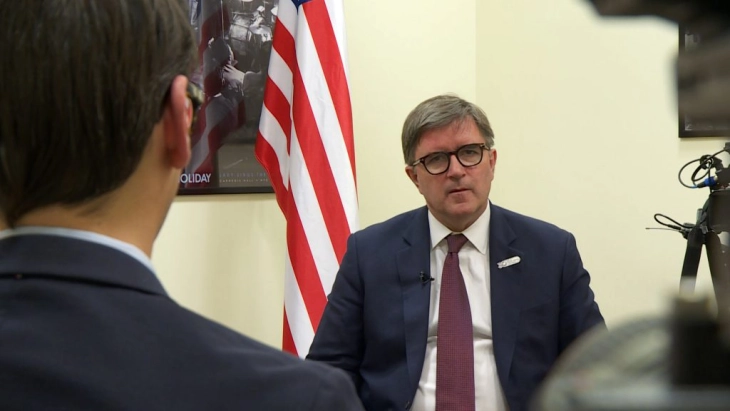O'Brien on constitutional changes: I wouldn't vote for someone who says, ‘I have a better offer, but I won't tell what it is’
- The US Assistant Secretary of State for European and Eurasian Affairs, James O'Brien, stated in an interview on MRT 1's '360 Degrees' that he wouldn't vote for someone who says, 'I have a better offer, but I won't tell what it is.' Responding to a question about whether he considers the US 'blacklist' effective, O'Brien stated that results take time for the process to yield outcomes, and he refrained from commenting on whether Washington is preparing to put any new individuals on the list.

Skopje, 30 November 2023 (MIA) - The US Assistant Secretary of State for European and Eurasian Affairs, James O'Brien, stated in an interview on MRT 1's '360 Degrees' that he wouldn't vote for someone who says, 'I have a better offer, but I won't tell what it is.' Responding to a question about whether he considers the US 'blacklist' effective, O'Brien stated that results take time for the process to yield outcomes, and he refrained from commenting on whether Washington is preparing to put any new individuals on the list.
“There is an offer on the table. And if you want to know who someone is and how they will act when in power, see how they react on that offer. If they say in a clear way, here is an alternative and believe it’s acceptable to others, then you can evaluate whether they are right or wrong. If they say I have a better offer but I am not going to tell you what it is – you would not buy a car from that person. So I do not think that you should vote for them either,” O'Brien in regard to the adoption of the constitutional changes.
This is the first interview of the Assistant Secretary of State for Europe and Eurasia, James O'Brien, for a Macedonian media outlet since taking office in October.
Responding to the question about the OSCE Ministerial Council, O'Brien assesses that it was indeed successful.
“Now I just was with the Ambassador of North Macedonia to NATO and to see the Foreign Minister of North Macedonia chair the meeting of the OSCE here in Skopje it’s really a nice feeling to see that kind of transition. One thing that came through all the comments today was how well North Macedonia had done this year in chairing the OSCE," he said.
OSCE, he added, has unique mission, it’s really about human rights inside the societies they belong to it and that has to be reflected in right to peace.
“Russian invasion of Ukraine is a grotesque violation, the continued occupation of Georgia and Moldova is violation of these basic rights, but it’s also down to things that affect people every day- so the right to people to marry whom they love, to be free from being in prison for their political believes, to be free of human trafficking all across from Central Asia to Europe, the OSCE is a key part of talking about these rights but also vindicating them. And to see being managed through a year in which Russia violated every principle on which the organization was based. And Russia tried to block most of the ways the organization is used to functioning. And Minister Osmani did a great job of keeping the organization functioning and carrying out its mandate. And this was acknowledgment of how well the country had done over the last year and setting it up for 2024. I think we have an arrange that will allow the organization to work well going forward,” O’Brien said.
Regarding the departure of US Secretary of State Antony Blinken from Skopje before the arrival of Russian Foreign Minister Sergey Lavrov, he denied that it was a message from Washington to Moscow.
"No. It is a message that Secretary Blinken thought it was important to break the schedule, to make sure he would be here and to show support for the OSCE and the chairmanship of Minister Osmani. The only available time, between the NATO meeting and the meeting in Israel, where he is trying to assist with that conflict, was to come last night. Why Minister Lavrov chose to show up late, I do not know,” O’Brien said.
He reiterated that the United States strongly supports North Macedonia's aspirations for the EU and believes that the majority wants to be part of Europe.
“You are right; some political structures think differently, some may receive money from certain places, some have legitimate aspirations from a minority perspective. However, I believe that the majority wants to be part of Europe, and we support that. This specific compromise, we think, is just part of how a country becomes fully European. The US is not a member of the EU, as they regularly remind, but the EU is built on compromises,” he said.
Regarding constitutional changes, he stated that "this specific compromise is to achieve the goal of EU accession," and it is important for North Macedonia and its neighbors to find ways to move forward.
Regarding whether he thinks putting new Macedonian citizens on the so-called blacklist produces any results, as some of these people continue to operate as usual, the US diplomat says that it is just one part of the overall strategy.
As for whether there will be new individuals on the blacklist, he mentioned that he has no intention of speculating about it at all.
Photo: 360 Degrees







